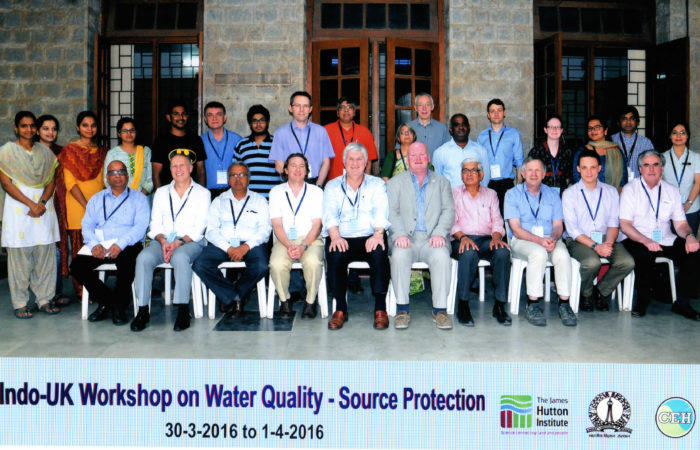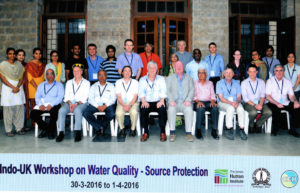23rd June 2016 Bangalore, India
Protecting water source

Dr. Richard Allan is the MDT Research Fellow: Sustainable Water Management, James Hutton Institute (JHI), UK. He has worked in industry for over 23 years and has held a number of senior management positions before becoming Chief Scientist at Scottish Water and then Managing Director at Scottish Water Horizons. Richard was in Bangalore co-ordinating a workshop on Indo-UK Workshop on Water Quality – Source Protection in March this year.
I have had the privilege and pleasure to work with some great people and organisations in India. In March 2016 I was delighted to be returning to the Indian Institute of Science (IISc), Bangalore where I led the delivery of a workshop on behalf of the James Hutton Institute in partnership with the Centre for Ecology and Hydrology (CEH) and IISc; supported by the Scottish Government. The workshop explored real-world opportunities for leading research collaborations focused on water source protection. Water source protection involves the protection of surface water sources and groundwater sources from contamination of any kind. This event was part of an ongoing series of initiatives between the UK and India designed to strengthen knowledge sharing in water management and deliver world class policy led science and engineering that addresses international challenges as set out in the Sustainable Development Goals.
The three day workshop hosted at the Indian Institute of Science was attended by 24 leaders in water science research and policy from both the countries. The organisations that were represented included James Hutton Institute (JHI), Centre for Ecology and Hydrology (CEH), Cranfield University, British Geological Survey, Portsmouth University, Indian Institute of Technology (IIT) Roorkee, IIT Madras, Indian Institute of Science (IISc) and Ecosystem Services and Poverty Alleviation programme. The workshop helped in developing a common understanding of the challenges relating to water source protection. The links and themes developed of the workshop crystallised thinking around a range or strategically important research areas which will be further developed into deliverable projects to be initiated in 2016. The common themes included: Modelling nitrate in groundwater, Development of a rural modular wastewater treatment system, Holistic and integrated community engagement, National, regional and catchment scale monitoring and evaluation , Development of the national regulatory laboratory capability, Adaption and adoption of a Hydro Nation philosophy to resource management, and Development of Innovation through support of young entrepreneurs.
In order to maintain momentum and capitalise on the emerging issues around water quality, three project areas were identified for immediate support: Development of the modelling of nitrates in groundwater, Development of a demonstration modular wastewater treatment system and Development of a workshop(s) to promote and support improvements to India`s analytical laboratory capabilities.
Overall, there was a strong consensus among the workshop participants for excellence in science delivered through partnership between India and the UK that underpins and informs policy making. The MOAs established between IISc and CEH and JHI support this collaboration, as does the recently awarded Newton Bhabha fund project “Upscaling Processes for a Sustainable Cauvery: Hydrologic Analysis and Policy Evaluation”. There was however, much discussion on further research and technology exchange between the two countries to meet the challenge of addressing the Sustainable Development Goals for water, energy, land use and communities. I am eagerly looking forward to carrying forward this work further and strengthen ties between both countries.